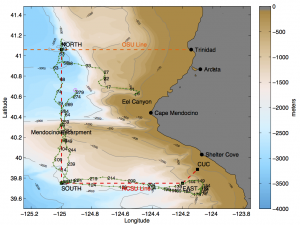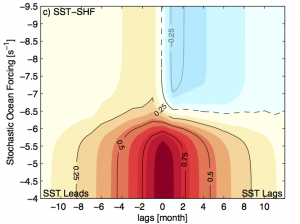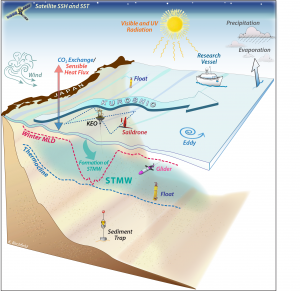The Lost Coast
 This is a collaboration with NOAA and the Humboldt State University Marine Lab to study the dynamics of the California Undercurrent and its links to cross-shelf exchange of dissolved oxygen and carbon in the Cape Mendocino region of Northern California. My research group is using a combination of Seaglider data (2014-present) and long-term monthly repeat hydrography (2010-present) observations part of CeNCOOS and PaCOOS. NCSU deployed a Seaglider from Eel Canyon aboard the R/V Coral Sea and it continuously monitored the region for over a month, from March to April 2017, obtaining high-resolution physical and biogeochemical data crossing the Gorda Escarpment and cross-shelf measurements near Shelter Cove along the Lost Coast.
This is a collaboration with NOAA and the Humboldt State University Marine Lab to study the dynamics of the California Undercurrent and its links to cross-shelf exchange of dissolved oxygen and carbon in the Cape Mendocino region of Northern California. My research group is using a combination of Seaglider data (2014-present) and long-term monthly repeat hydrography (2010-present) observations part of CeNCOOS and PaCOOS. NCSU deployed a Seaglider from Eel Canyon aboard the R/V Coral Sea and it continuously monitored the region for over a month, from March to April 2017, obtaining high-resolution physical and biogeochemical data crossing the Gorda Escarpment and cross-shelf measurements near Shelter Cove along the Lost Coast.
Scale-Dependence of Midlatitude Air-Sea Interaction
 NASA-funded project to understand the time- and space-scale dependence of air-sea interaction. Classic papers on air-sea interaction argue that the ocean is passive in the sense that its sea surface temperature variability is driven solely by atmospheric forcing. Coarse resolution coupled climate models exhibit this, but when coupled climate models are run in a configuration where mesoscale eddies, O(100 km) and monthly time scales, are resolved Western Boundary Currents and regions along the Antarctic Circumpolar Current show that SST variability is driven by internal ocean processes rather than from atmospheric forcing alone. With this project we use state of the art observations to determine the time and space scales at which the ocean transitions from ocean-driven to atmosphere-driven SST variability.
NASA-funded project to understand the time- and space-scale dependence of air-sea interaction. Classic papers on air-sea interaction argue that the ocean is passive in the sense that its sea surface temperature variability is driven solely by atmospheric forcing. Coarse resolution coupled climate models exhibit this, but when coupled climate models are run in a configuration where mesoscale eddies, O(100 km) and monthly time scales, are resolved Western Boundary Currents and regions along the Antarctic Circumpolar Current show that SST variability is driven by internal ocean processes rather than from atmospheric forcing alone. With this project we use state of the art observations to determine the time and space scales at which the ocean transitions from ocean-driven to atmosphere-driven SST variability.
Carbon Hot Spot

Carbon Hot Spot is a collaborative effort with US, Japanese, and Chinese scientists to understand the role of mesoscale and submesoscale processes in air-sea interaction, Subtropical Mode Water (STMW) variability, and carbon sequestration in the Kuroshio Extension region centered around the Kuroshio Extension Observatory (KEO). Upcoming field work will be conducted in Winter 2018 aboard the JAMSTEC R/V Shinsei Maru.
